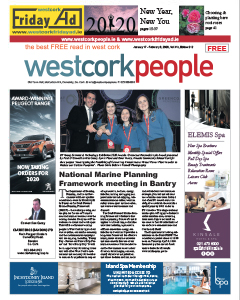Thirty years ago, in 1989, organic market growers Jean and Peter Perry moved with their four young daughters to The Glebe in Baltimore. As their children grew, so too did the five-acres of coastal garden at The Glebe, with the help of Jean and Peter. Today, the garden, which features a mixture of vegetables and flowers, is a member of the West Cork Garden Trail and supplies much of the produce for the award-winning Glebe café and restaurant, which opened in 2004.
A no-dig enthusiast since she first discovered the great Charles Dowding in the eighties, Jean is very excited that he has accepted her invitation to teach a one-day gardening course on growing vegetables and fruit at Glebe Gardens in May. From just a quarter acre, Dowding grows year-round salad leaves and vegetables for shops and restaurants.
“This is a chance to learn from one of the most influential gardeners of our time, from somebody who’s spent the last 25 years studying how to grow more plants with less effort,” says Jean passionately. “It’s a really sustainable type of gardening, as by not digging the soil, you don’t release carbon, you just keep adding compost or seaweed. The course will be on Saturday, May 25 and there are limited places.”
Over the past 30 years, Jean has employed this no-dig method at Glebe with impressive results. The large ornamental vegetable garden produces a wide range of salads, greens and other vegetables, herbs, fruit and flowers, for the café and the family. By combining vegetables with flowers and herbs, the Perrys have created a beautiful micro environment, encouraging bees, butterflies and other beneficial insects.
Below the herb garden are two long herbaceous borders, designed to complement the peace and tranquillity of the herb garden, using mostly pastel shades and scented flowers.
Around these gardens are areas of woodland, which have been underplanted with interesting shrubs and perennials. On your walk, you’ll wander upon the round succulent leaves of Pennywort, the pretty pink groundcover plant Claytonia sibirica and the delicate white flowers of garlic mustard – all edible. Other plants in the woodland to look out for are Pulmonaria (lungwort), sweet cicely, Soloman’s seal and yellow-flowered deadnettle (Lamium galeobdolon). You’ll eventually come to a bridge over water, which will bring you into old meadow overlooking Church Strand Bay.
So how did this wonderful journey begin for the Perrys and Glebe Gardens all those years ago?
Jean and Peter were organic market gardeners in the UK in the eighties. “Out of the blue one day this 18-year-old lad called Richard from Cape Clear arrived on our doorstep in the Cotswalds looking for work,” says Jean. “I asked him if he could drive a tractor and he answered ‘no but I can learn in an afternoon if you give me a chance’. He stayed with us for four years,” she says. “He was a charming, educated young man, very entertaining and fun! A few times we found a note in the barn saying ‘see you in a month, I had to go back to Ireland’. But we loved him and he loved us, so it just worked.”
To make a long story short- (ish), the Perrys had been working very hard for a number of years and were exhausted. “We’d never even had the chance to take a proper holiday with the girls,” says Jean “so at the time we were looking around in the UK and Wales for something else we could do when Richard suggested Ireland.
“Any mention of Ireland in the 80s in the UK had to do with the IRA and bombings, so my immediate reaction was you can’t be serious,” says Jean. “Richard simply shrugged and said you know you’ll probably be safer there than you are here.
“It got us thinking,” says Jean. “So we booked a two-week holiday in Kerry through a travel agent.”
After taking the ferry to Rosslare, they made the six-hour drive to Kerry. “We arrived in Kerry about half past 12 that night and, after driving down a number of small country lanes, we came to a pier where the only light was from a pub with the curtains drawn,” says Jean. “We knocked on the door, even though it went against our better ‘very English’ judgement to disturb someone so late at night,” she says. “The door opened and the entire place was buzzing inside,” she says laughing. “Out came this man – our landlord – who told us where we were going was the most beautiful place in the world and ‘we’d think ourselves in paradise in the morning’. We thought he was mad!
“However, when we got to the house, there was a fire laid and a plate of smoked salmon sandwiches and a half bottle of whiskey on the table waiting for us – it was the most amazing welcome,” recalls Jean nostalgically. “And, when we woke in the morning, we were indeed in paradise. A big blue lagoon faced us. The landlord gave us a machete to beat a path to the beach,” she says laughing. “There wasn’t a soul there at the beginning of June.”
After a wonderful two weeks, the Perrys went home and put their house on the market straight away.
“The market was dropping in the UK but we were lucky to have a unique house that we’d done up from derelict. It sold straight away,” says Jean.
In September, Jean and Peter returned to Ireland to look for a house. “We stayed at Lettercollum in Timoleague, which was an experience too,” she says grinning. “When we arrived there was a guy hanging out of a window with a baby in one arm and tossing pancakes with the other. We had such good fun there with lovely people.
“Cork just felt that bit more cosmopolitan than Kerry!” says Jean.
After making an offer on a house in Caheragh near Skibbereen, the couple took a fateful drive down to Baltimore that afternoon.
“We saw the estate agent John Cross’ sign. He showed us Glebe and we just fell in love,” says Jean. “It was an easy sell.”
Jean and Peter drove down to the village, where they sat in the cove and persuaded themselves they were going to do bed and breakfast. “Honestly, four childen and three bedrooms, we were never going to do bed and breakfast,” says Jean with a smile. “It was more money than we wanted to spend but we had to have it.
“We went back and wrote the cheque for the deposit and went home and packed up.”
Peter’s parents came over as well but settled in Castletownsend. Jean’s parents followed them over a few years later.
“The first year was really exciting,” remembers Jean. “We turned a barn into two holiday lets that my mum and dad moved into eventually. But that was all of our money gone. We then started to realise how hard it was to make a living here so had a few scary years.”
The Perry’s thought about selling up after three years but John Cross was very supportive and encouraged them to stick it out for a while longer. “It was the best thing we ever did and I’m very grateful to John Cross for that,” says Jean.
Initially they grew veg, as that’s what they’d always done and at least they could feed their family from it. Then Jean became interested in gardening outside of vegetables and started putting in hedges and trees. Glebe joined the West Cork Garden Trail and Jean got a job in Creagh Gardens for a while.
“But by 2004 I was getting older and tired from the physical work,” she explains. This is what prompted Jean to start The Glebe Cafe.
“It was small but was going really well and then in 2006 the fire officer called to the door,” she says. “It was a case of do this properly or just stop.”
So Jean and Peter, with the backing of their children who confirmed they’d like to come back and run the business one day, sold the lodge on their land and put the money into opening a proper café.
Now the award-winning Glebe Cafe and restaurant is run by the four Perry sisters, Tessa, Kez, JoJo and Mia.
“I’ve stepped back from the café and I’m really just the gardener, gofer and grandmother now,” says Jean laughing.
“I can’t imagine not living here now…by the sea…it’s a small community that we really love,” says Jean. “I feel really lucky and thankful that we are able to make a living in such a beautiful place.”


